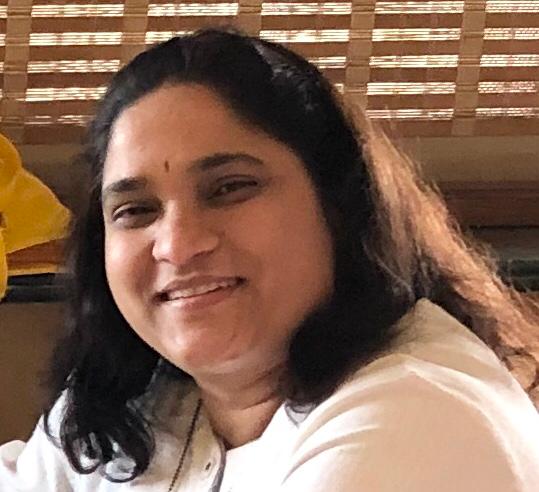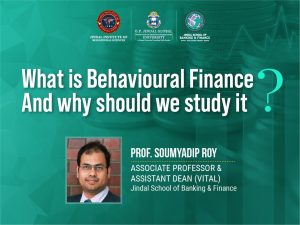“There are only a handful of environmental lawyers in India today, and we definitely need more.”
Be the ‘Enviro-Legal Expert’ the world needs—apply now for an LL.M. in Environmental Law, Energy & Climate Change
Environmental challenges are rapidly rising. From sinking coastlines to smoggy skies and shrinking forests, the world is witness to the brutality of environmental negligence and devastating effects of climate change. The Centre for Environmental Law, World Wide Fund for Nature India, in association with Centre for Post Graduate Legal Studies, Jindal Global Law School, O.P. Jindal Global University offers a one-year LL.M. in Environmental Law, Energy & Climate Change to equip a capable, committed, conscious young generation of lawyers to tackle environmental issues. JGU speaks with Ms. Moulika Arabhi, Advisor, CEL, WWF India about the programme and its unique opportunities.
Q. Combining aspects of environmental law, energy and climate change with legal expertise from a premier law school, JGLS, and field-based expertise from a premier conservation organisation, WWF India, makes this LL.M. truly one-of-a-kind. How did it come to be?
For WWF India, the dissemination of knowledge around conservation and environmental protection is a key focus area of our work. So we were already thinking about a course. Parallelly, JGU wanted to incorporate a practical, field-based approach to legal training in these areas.
So this programme is not just about environmental law, but the connected factors of energy and climate change which are emerging topics. We need to understand these to get a holistic perspective on the current scenario and that of the future, for newer laws to come into place. Climate change in India doesn’t have any laws yet. So far it’s one policy here and there, or it’s just mentioned in action plans. Everyone talks about climate change but not how climate change can be addressed within existing environmental laws. People will talk about energy demands or energy access, but not about how laws support that energy access.
So in our initial talks with JGU, we always discussed the idea of a course which brings in all these aspects together. We also spoke to professionals, mainly lawyers, and they were also looking for something that would give them a holistic idea. We want to really train people as environmental lawyers.

Ms. Moulika Arabhi, WWF-India and Professor Sridhar Patnaik, JGU delivering the orientation lecture at Jindal Global Educational & Professional Academy, NTH Building, Qutub Institutional Area, Delhi
Q. Are there enough environmental lawyers in India?
There’s only a handful of environmental lawyers in India today. There may be not more than 10—that too only after the National Green Tribunal started addressing environmental cases since 2010. And if you consider those whose only focus is environment, then there are not more than four or five.
So this is a huge gap.
Though these days, many law firms have specialists who deals with environmental clearance matters. So there will be lawyers looking at environmental law as maybe 25% of their work, not 100%. We need to convert that 25% into 100%. The only way is to build that capacity.
Q. How strong is environmental law education in India right now to build that capacity? And how does this programme stand out?
There are many universities who’ve designed such programmes now. But one of the major challenges in this field—and what we want to overcome—is the qualitative strength and diversity of the faculty. Unless and until you approach these courses with a holistic perspective and have a combination of both academicians and practitioners of various specialised subjects on board, you cannot effectively train students to be enviro-legal experts.
The faculty plays a crucial role in such niche courses. These are very specialised areas. So it’s very important to have mentors who understand the subject in that depth. The design and implementation of the course also plays a key role in making such programmes a success.
You also need to take students to the field and look at the real challenges on the ground. Can the laws we’re learning about in the classroom actually be applied on the field? If it has challenges, then how do you find solutions?
Q. So how hands-on is the training?
We’ve designed an exclusive 3-credit course called ‘Implementation of Environmental Laws in India’, which is a field study. Students will spend at least five days in the field and learn various aspects of environmental issues. They will get a chance to speak to many stakeholders including government, civil society, activists and communities who live in that area to understand the real challenges. There are also at least two other field visits to protected areas. The sites we choose are climate vulnerable. This time, the batch was supposed to visit the Sundarbans, but because of COVID-19 we’ve had to postpone it.
Unless you go out and see what the ground realities are, it’s very difficult to understand the whole picture. No other university offers a course where students get to see both conservation work and on-field implementation. We want to give them that edge.
This is an experience young people really urge for, but not everyone has access to. We’ve learnt that people are looking for a thorough investigative approach. This is one course that even if students don’t do internships, they get much more experience.

LL.M. students at Sultanpur National Park during a field visit
Q. The curriculum bridges the gap between academics and application in a big way. Can you elaborate on how WWF adds the practical perspective?
It’s very clear that it’s not completely academic. The programme offers a blend of theory and practicality. WWF is a conservation organisation, so our emphasis is more on capacity building of lawyers.
There are core courses taught by JGU’s law faculty, then there are specialised courses—International Environmental Laws, National Environmental Laws, Energy Laws & Policies, Climate Change Governance, Renewable Energy Development in India, Adaptation to Climate Change, and Implementation of Conservation Laws in India: Field Study. Our expertise comes in implementing these specialised courses through our work on ground. That’s the value WWF India brings to the table.
Q. Many prominent personalities from law, academia and the environment are associated with this programme. What kind of mentorship can students expect?
This is the best of what we’re offering our students! There’s a combination of academicians, lawyers, practitioners, environmental researchers, energy experts, climate adaptation experts, and judges from India and the world over. The few environmental lawyers in India are all teaching in this course. That’s the kind of exposure we offer. That combination of academic thinking and practical orientation is the best anyone can ask for.
It’s not just the degree, but having these interactions and attending many conferences and seminars that give students a unique opportunity.

Q. It’s important to look at both national and global perspectives—how is this brought out in the curriculum?
The curriculum gives a holistic view of international environmental laws. At the same time, it is rooted in the national context. We didn’t want to narrow it down just to India. This also keeps it open for international students.
There are two courses exclusively on international environmental laws and one focussed on national environmental laws. Without an understanding of the international laws, one cannot really interpret the national laws. In a way, national laws have emerged along with the changing international scenario. Everything has a linkage.
Q. Many environmental groups, individuals and lawyers are challenging governments and corporates across the world with climate change lawsuits. What is the scope of climate litigation in India?
Climate litigation is the future. Environmental problems are increasing and awareness is rising, so climate litigation will happen in India very soon. We want to train people who can take up these cases and do justice.
Q. You’ve already talked about the need for more environmental lawyers in India. What are the other roles graduates can look forward to?
We call our students ‘enviro-legal experts’. You will have a handle on both the legal and environmental perspectives. This combination opens all kinds of avenues for the LL.M. graduate. You can choose to be environmental lawyers or litigants. There are many environmental organisations and law firms that need trained environmental law experts.
This degree will also help you in environmental law research, an area which needs a major focus now. If you pick up any environmental case, you’ll see a lot of maps, graphs, scientific data and research. A thorough analysis is required. Litigation will have to look at a holistic picture to convince the court. So there need to be people who can produce quality research which can then be used by courts or converted into petitions to challenge environmental matters.
There’s also a huge potential of getting into academics. Of late, there are many universities who’ve realised the importance of these subjects and are launching courses around environmental laws, climate change, environmental sciences and climate policy.
Today, India is signatory to many multilateral environmental agreements. Many major concerns in our country and around the world are linked to the environment. Everyone wants solutions. Solutions can only be given by trained people. So our students can contribute actively to UN organisations, WWF, and many other conservation organisations or environment-based organisations as well.
You can also choose to get into policy work or public administration. Such training is great at many levels. It is a niche. In terms of career opportunities in environmental law, this is the course to apply for!

LL.M. students enjoy a special seminar by Mr. Rohan Chakravarty, Artist, Cartoonist, Environmental Illustrator, Columnist, The Hindu
Q. What are you looking for in students?
It’s a tightly packed programme. To understand everything about environmental law, climate change and energy in a year’s time span is a lot for anyone to absorb. But the reason we make it so rigorous—the syllabus is very selective, each course will have only 10-12 classes, speaking about prominent areas within broader thematic areas—is to make it as useful as possible.
So the only ask we have is that you be willing to give that one year of hard work. Be aggressive in your learning. There has to be an instinct for investigating and understanding solutions. You need research and analytical skills, and motivation to go out in the world and work towards areas that need serious intervention.
Q. How accessible is it for working professionals?
Classes are held on Thursdays, Fridays and Saturdays because we wanted it to be available for working professionals. Many students in India get absorbed into jobs after completing their B.A. LL.B. They should have that window to upskill themselves even while pursuing ongoing careers.
Q. How has the experience with the first batch been? What are you expecting in the future?
Those who choose this programme are very focussed in their thinking. They’re aware that problems of the environment, climate and energy exist. They want to find solutions. This course is designed in a way that it offers them those solutions, both from a legal and environmental point of view. Students of the first batch are looking forward to getting into research, litigation and academics.
We have received very good feedback from the existing batch, and many queries for the next. People are coming forward and want to know more and enrol in the upcoming programme. We put a lot of thought into designing this programme and we’re happy to see such interest. Environmental law should not just be an option, but a choice.
Learn more about the programme: https://www.wwfindia.org/about_wwf/enablers/cel/tcapbuilding/llm_programme/



